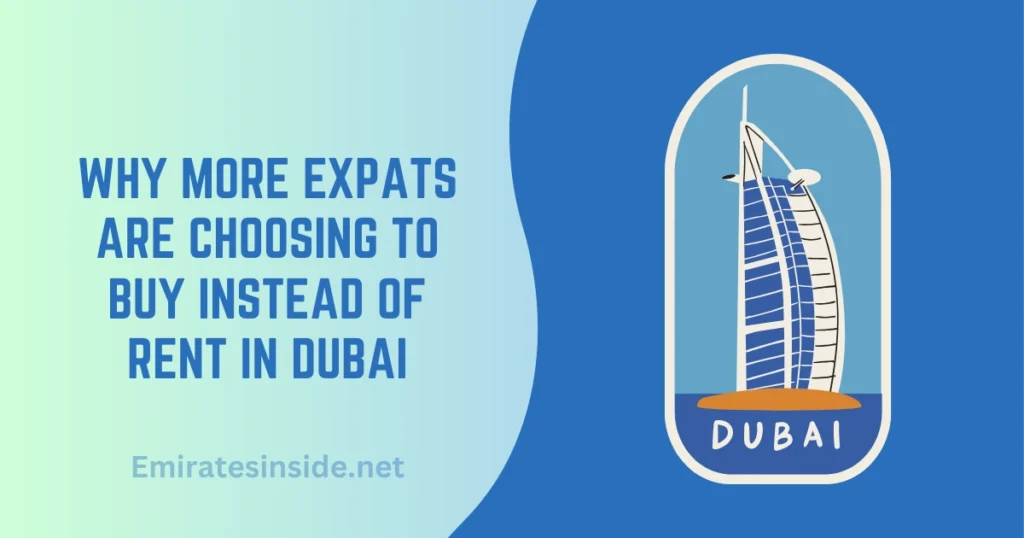Why more expats are choosing to buy instead of rent in Dubai
Dubai has always attracted dreamers—entrepreneurs, professionals, and families from around the world seeking opportunity, sunshine, and a better lifestyle. For many years, renting was the default choice for most expats in the UAE. But recently, there’s been a clear shift: more and more expats are choosing to buy property in Dubai instead of renting.

If you’re doubting whether to rent or buy, this guide is for you. Below, we’ll break down the reasons behind this growing trend—and what it could mean for your own future in Dubai.
1. Dubai’s property market is now more accessible to expats
One of the biggest changes over the past decade is how much easier it has become for expats to own property in Dubai.
- Freehold areas: Expats can now buy property in designated freehold zones across the city—including popular spots like Dubai Marina, JVC, Business Bay, and MBR City.
- Flexible payment plans: Many developers offer attractive post-handover payment plans and low down payments, making it easier to own without a massive upfront investment.
- No property tax: Unlike many global cities, Dubai doesn’t charge property tax, making long-term ownership more cost-effective.
With these advantages, more expats are seeing homeownership as a smart and achievable goal.
2. Buying is more cost-effective in the long run
Renting might seem simpler at first, but over time, the money you spend on rent adds up—with no asset to show for it.
Let’s compare:
- Renting a one-bedroom apartment in Dubai Marina may cost you AED 110,000 per year.
- Over 5 years, that’s AED 600,000 paid to a landlord.
- Buying a similar apartment for AED 1.2M with a mortgage could mean monthly payments around AED 6,500 (depending on your interest rate and terms).
- After 5 years, you’ll have paid into your own asset, built equity, and still own the property.
It’s no surprise more expats are asking themselves: “Why rent when I could be investing in my own future?”
3. Residency visa options for property buyers
Another big incentive? Buying property in Dubai can get you a residency visa.
Here’s how it works:
- Buy a residential property worth AED 750,000 or more, and you may qualify for a 3-year renewable visa.
- Invest AED 2 million or more, and you may be eligible for a 10-year Golden Visa.
These visa options give you more freedom and security, especially if your employment status changes. And for families, a property-linked visa offers a more stable foundation for life in Dubai.
4. Rising rents are pushing tenants toward ownership
Dubai’s rental market is heating up again. According to recent reports, rents in prime areas like Downtown Dubai, Palm Jumeirah, and Dubai Hills have risen by over 20% year-on-year.
As a tenant, this can mean:
- Facing higher rent each year
- Difficulty negotiating renewals
- Uncertainty around long-term costs
Buying, on the other hand, offers predictable monthly payments (especially with a fixed-rate mortgage) and protects you from sudden hikes.
5. Expats have more mortgage options than ever
It wasn’t always easy for expats to get a mortgage in Dubai—but things have changed.
Today:
- Expats can borrow up to 80% of the property value for their first home
- Banks offer both fixed and variable interest rate options
- You can compare different offers through a mortgage broker, who helps you find the best deal based on your salary, nationality, and budget
A good broker not only saves you time but can also help you understand all the costs involved—like valuation fees, insurance, and DLD charges.
6. Dubai’s market is more transparent and investor-friendly
Several government initiatives have boosted confidence in the real estate sector:
- The Dubai REST app allows you to verify properties and landlords directly
- Stricter regulations have reduced off-plan fraud and improved developer accountability
- Initiatives like Dubai Land Department’s open data make it easier for buyers to track prices and trends
With this transparency and ongoing growth in infrastructure—think: new metro lines, schools, and business hubs—buying in Dubai is now seen as a safer and more strategic investment.
7. Lifestyle upgrades come with ownership
Aside from financial reasons, there are lifestyle perks to owning your home:
- Stability: You’re not at risk of being asked to vacate on short notice
- Freedom: Want to renovate, redecorate, or bring in pets? No landlord approval needed
- Community living: Many expat families buy in gated communities that offer pools, gyms, play areas, and schools within walking distance
Buying isn’t just a financial decision—it’s a lifestyle one, especially if you’re planning to stay in Dubai for more than 3–5 years.
8. When renting still makes sense
While buying has its clear advantages, renting isn’t always the wrong choice. It depends on your situation.
You might still choose to rent if:
- You’re in Dubai short-term (less than 2–3 years)
- You’re unsure about your job stability
- You prefer the flexibility of moving every year
- You’re still saving for a down payment
The key is to assess your long-term plans, current financial health, and how ready you are to settle in one area.
Conclusion
For many expats, buying a home in Dubai is no longer out of reach—it’s a realistic, smart, and potentially profitable choice.
With affordable property options, long-term visas, rising rent prices, and access to expat-friendly mortgages, it’s clear why so many are making the shift from tenants to homeowners.
Still unsure? Speak to a qualified mortgage broker to understand your options, calculate your affordability, and see if buying could be the right move for you.




